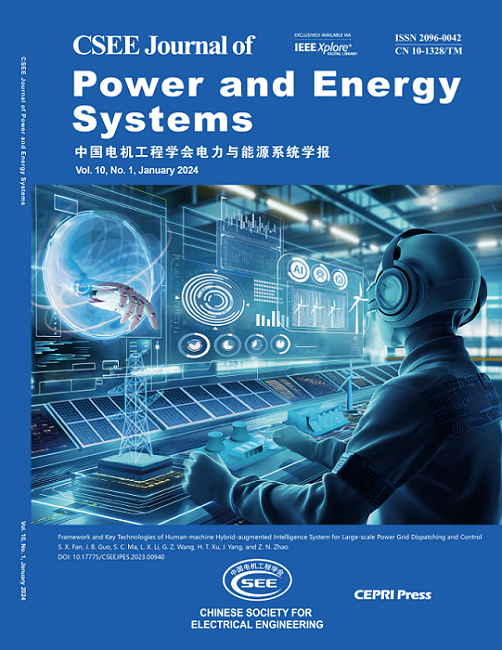基于电压源转换器的交流微电网内部模型控制中升压转换器参数的分析与优化
IF 5.9
2区 工程技术
Q2 ENERGY & FUELS
引用次数: 0
摘要
本文通过由直流-直流升压转换器和直流-交流电压源转换器(VSC)子系统组成的两级功率转换结构,研究了微电网(MG)中分布式能源资源(DER)的集成问题。与将直流链路电压视为理想恒定电压的现有研究不同,本文考虑了这两个子系统之间的非理想动态耦合,以实现完整性和更高的精度,这为 VSC 引入了额外的直流侧动态。分析显示了升压转换器功率模型中影响直流链路稳定性的参数。仔细选择这些参数可减轻对稳定性的影响,并改善整个直流链路的动态性能。因此,我们开发了一个优化框架,以便在设计基于电压源转换器的稳定微电网(VSC-MG)时选择适当的升压转换器参数。所开发的优化框架以粒子群优化为基础,考虑了两个子系统之间的动态耦合,还能有效避免升压转换器参数不足,从而将不稳定性通过直流链路传播到电压源转换器。我们使用 MATLAB/Simulink 进行了仿真,以验证理论分析。本文章由计算机程序翻译,如有差异,请以英文原文为准。
Analysis and Optimization of Boost Converter Parameters in Internal Model Control for Voltage Source Converter-Based AC Microgrids
This paper investigates integration of distributed energy resources (DERs) in microgrids (MGs) through two-stage power conversion structures consisting of DC-DC boost converter and DC-AC voltage source converter (VSC) subsystems. In contrast to existing investigations that treated DC-link voltage as an ideal constant voltage, this paper considers the non-ideal dynamic coupling between both subsystems for completeness and higher accuracy, which introduces additional DC-side dynamics to the VSC. The analysis shows parameters of the boost converter's power model that impact stability through the DC-link. Carefully selecting these parameters can mitigate this effect on stability and improve dynamic performance across the DC-link. Hence, an optimization framework is developed to facilitate in selecting adequate boost converter parameters in designing a stable voltage source converter-based microgrid (VSC-MG). The developed optimization framework, based on particle swarm optimization, considers dynamic coupling between both subsystems and is also effective in avoiding inadequate boost converter parameters capable of propagating instability through the DC-link to the VSC. Simulations are performed with MATLAB/Simulink to validate theoretical analyses.
求助全文
通过发布文献求助,成功后即可免费获取论文全文。
去求助
来源期刊

CSEE Journal of Power and Energy Systems
Energy-Energy (all)
CiteScore
11.80
自引率
12.70%
发文量
389
审稿时长
26 weeks
期刊介绍:
The CSEE Journal of Power and Energy Systems (JPES) is an international bimonthly journal published by the Chinese Society for Electrical Engineering (CSEE) in collaboration with CEPRI (China Electric Power Research Institute) and IEEE (The Institute of Electrical and Electronics Engineers) Inc. Indexed by SCI, Scopus, INSPEC, CSAD (Chinese Science Abstracts Database), DOAJ, and ProQuest, it serves as a platform for reporting cutting-edge theories, methods, technologies, and applications shaping the development of power systems in energy transition. The journal offers authors an international platform to enhance the reach and impact of their contributions.
 求助内容:
求助内容: 应助结果提醒方式:
应助结果提醒方式:


